2017-18 Premier League DARTS, Week 13: Liverpool-Chelsea, Pulis-y West Brom and dysfunctional Everton
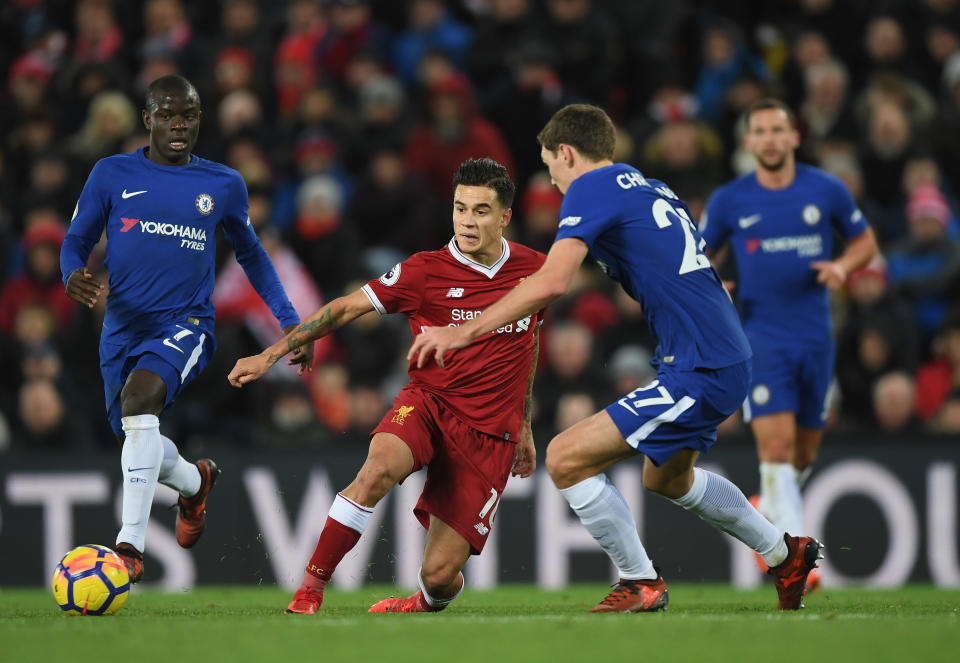
Welcome to Premier League DARTS, FC Yahoo‘s weekly EPL column that will run every Monday morning. Why “DARTS”? Because Henry Bushnell will recap the weekend’s biggest games with Discussion, Analysis, Reactions, Takeaways and Superlatives. All of that is below. But first, a brief intro …
There are very few easy games in the Premier League. If Pep Guardiola didn’t know that when he took up his post at Manchester City 17 months ago, he surely learned it last year. And it’s why, in the immediate aftermath of City’s 2-1 victory over Huddersfield on Sunday, the Spaniard couldn’t contain himself.
It’s why he stalked over to assistant coach Mikel Arteta for a ferocious embrace. It’s why he hugged players so vigorously; why he grabbed and shook their heads so joyously, like a proud father; why he pumped his fists toward the traveling fans.
“I cannot remember one team, not United with Sir Alex Ferguson or Arsenal with Arsene Wenger, who won all the leagues with 4-0 and 5-0 wins all the time,” he would later say. “It is impossible. You have to suffer.”
City wasn’t the only Premier League blueblood who suffered this past weekend. In fact, all six of the Big Six got real tests. At halftime of their respective games, City and Tottenham trailed Huddersfield and West Brom. Man United and Arsenal were stuck in neutral against Brighton and Burnley. Liverpool and Chelsea were locked in a stalemate with each other.
Forty-five minutes later, on a weekend that shouldn’t be forgotten come May, three of the six emerged with victories. United needed a wicked deflection. Arsenal needed a stoppage-time penalty. City profited from a large slice of luck as well.
But there was still something special about the Citizens. Something different about the way they went about their comeback. Their opponents were excellent, but they piled on pressure like no other team in the world can – pressure that hardly any foe could withstand. They attacked from all angles, carving out space rather than waiting for it to appear.
Pep and his players know that there will be slogs. There will be battles. They seem more equipped than ever to win those battles. Now it’s up to the rest to keep up with their record-setting pace.
And in the weekend’s one top-six showdown, neither Liverpool nor Chelsea did. It’s there, at Anfield, that we’ll begin the 13th edition of Premier League DARTS.
1. Eden Hazard, one-man attack
It is impossible to tackle the complexity of Liverpool-Chelsea with one analytical lunge. The Jurgen Klopp-Antonio Conte duel featured several plot twists and strategic turns. The second 45 minutes looked unrecognizable compared to the first. But the most startling aspect of the first were Chelsea’s routes to goal.
There were more or less two of them. Only two. The Blues sat in a rigid 5-3-2, and were comfortable retreating into their own half. Their main outlet wasn’t anything coordinated or fancy. It was simply Eden Hazard.
And he was a sight to behold. He engineered just one chance of note for himself, but his runs and escapes of triple- and quadruple-teams were breathtaking. The problem was that he had very little support.
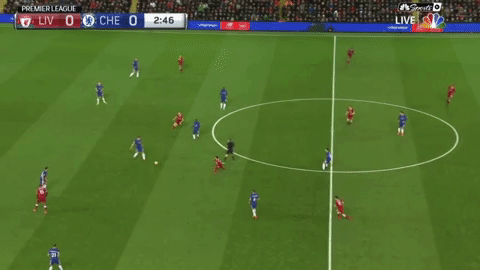
On one memorable occasion, he seemed to plead for that support. And then he said to himself, f*** it, I’ll just dance by a defender and create the best chance of the half on my own.
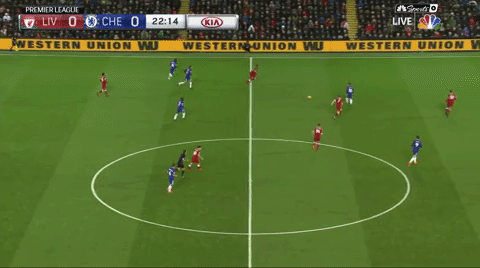
But not entirely on his own. He needed a well-timed run from Danny Drinkwater. That, precisely, was Chelsea’s other route to goal.
But unlike the Hazard-led counters, Drinkwater’s forward jaunts came with a bit of defensive risk. The risks yielded chances for Chelsea. But one was partially responsible for a big chance at the other end. A very big one.
2. How Drinkwater’s eagerness led to the Liverpool goal
Three weeks ago, we touched on the importance of box-to-box midfielders in Conte’s modified 3-5-2. Hazard and Alvaro Morata need some support. Tiemoue Bakayoko has given it to them in the past. On Saturday, a large chunk of the responsibility fell to Drinkwater, and he took it on fairly well. He’s not the most adept in the final third, but he gave the Liverpool defense a third attacker to think about.
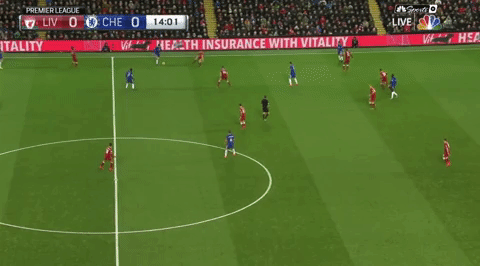
In a crucial second-half sequence, however, his attacking responsibilities compromised his defensive ones.
When Chelsea won the ball in the 65th minute and attempted to play out from the back, Drinkwater advanced into a right-wing position. When Caesar Azpilicueta’s attempt to pick him out was cut out, Drinkwater – like Bakayoko, who had also crept forward – was trailing the play.
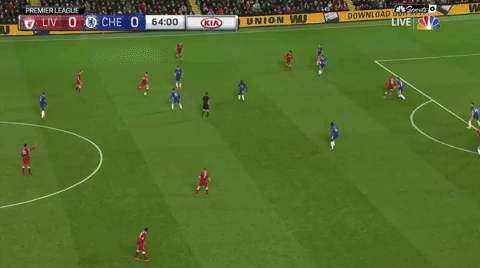
The usually reliable N’Golo Kante leapt into a challenge and came up empty. With neither Drinkwater nor Bakayoko able to provide cover, Philippe Coutinho bore down on Chelsea’s back three. Salah sliced through them and put the hosts ahead.
The goal was not a single player’s fault. It’s more so a reminder that all tactical decisions are trade-offs. They are, to varying extents, sacrifices. Chelsea experienced that dynamic Saturday. Fortunately, Willian’s “shoss” – cross/shot – rescued a point.
3. The Ghost of Tony Pulis, part 1: The Back Six
Tony Pulis was not physically present at Wembley Stadium on Saturday. Perhaps he was back in his native Wales, sipping red wine with Pep. Perhaps he had wandered to a West Midlands pub, unrecognizable sans baseball cap and glasses.
But five days after his sacking, the Pulisian spirit was alive and well within West Brom. And it haunted Tottenham in a disappointing 1-1 draw.
It manifested itself in many ways, most notably in the defensive system the Baggies employed. They were as Pulis-y as ever. They were so compact – not just vertically, but horizontally. They shifted from a back four to what was effectively a back five or six, with fullbacks pinching in and wide midfielders dropping into fullback positions. Here it is as a 5-3-1-1, with 10 of 11 players behind the ball:
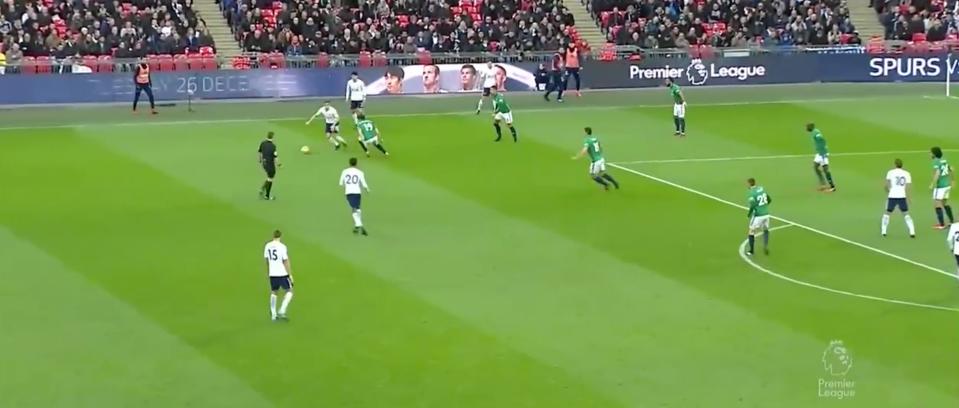
The narrowness is a Pulis staple. The ball-side wide midfielder covers for the ball-side fullback, who slides inside to shut off central avenues. The weak-side wide midfielder comes inside to function as a third central midfielder, clogging space at the top of the box, and pestering opposing playmakers:
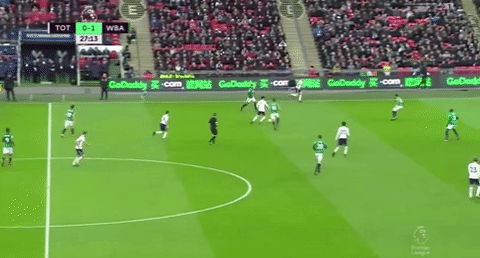
The system is vulnerable to quick switches of play, but if executed right, it cuts down on the speed of those switches, and allows for rotations. West Brom executed well after nicking an early goal, and combatted three different Spurs looks to hold on for a draw.
4. The Ghost of Tony Pulis, part 2: time-wasting
What other evidence do we have of the Pulisian spirit? Example No. 1, courtesy of a sly Jay Rodriguez after West Brom has won a throw:
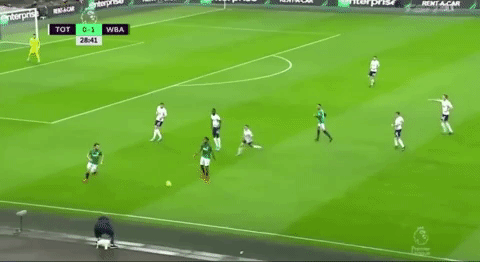
Example No. 2, courtesy of a more blatant Ben Foster after Spurs have won a corner:
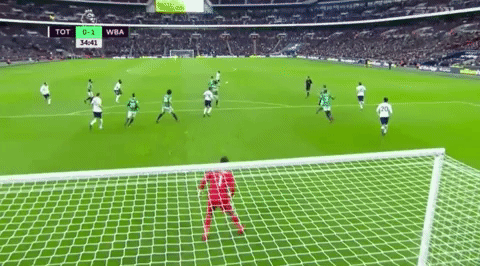
Pulis teams are expert time-wasters. He teaches this stuff. From the moment Salomon Rondon’s 4th-minute goal went in, Foster regularly took around 28 or 29 seconds between the ball leaving play and his goal kicks. Allan Nyom spent as many as 20 seconds dallying on throw-ins.
Foster wasn’t booked until the 82nd minute, at which point he had already shaved several minutes off the game. The time-wasting seems innocuous in the first half. But it adds up. Games involving Pulis teams infamously feature far less ball-in-play time than average Premier League matches. Saturday’s was technically not a game involving a Pulis team, but it might as well have been.
5. Pep Guardiola’s Raheem Sterling tutelage
Sterling’s breakout season continued Sunday with his 12th goal in all competitions – already a personal single-season best – and a second late winner in five days. After an inconsistent start to his City career, the English winger has improved in so many ways. And it’s clear he’s flourishing under the teachings of Guardiola.
He has improved technically, sure. He has gotten stronger, and learned how to better use his natural gifts. But his most impressive attribute is his movement. He has learned when and where to use his pace. His enrollment in the Guardiola School of Attacking Football is the best thing that’s ever happened to his career.
The Huddersfield winner might not have been the best example of Sterling’s awareness. But the penalty was a pretty darn good one. And his midweek goal against Feyenoord … well, it’s irrefutable evidence:


